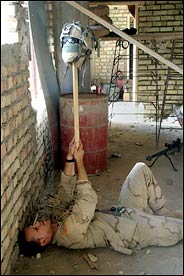Daniel Drezner, incredibly, wants Mikhail Saakashvilli, currently President of the Republic of Georgia, to be President of the United States. The reason is that Saakashvilli has reduced corruption in Georgia and decreased the size of its government.
Drezner must have missed recently the part about Saaksvhilli doing his very best to start a war with Russia.
Some background: after the breakup of the Soviet Union, the regions of South Ossetia and Abkhazia have been de facto independent of Georgia. Although grouped with Georgia within the Soviet Union, they are ethnically and culturally different and refused to become a part of Georgia after communism ended. A bloody civil ensued, ending with independence for these regions in '93.
Saakashvilli has repeatedly said that he will re-integrate Abkhazia and South Ossetia into Georgia, by force if necessary - which has brought him into conflict with Russia which wants the regions to remain independent.
Recently, Saakashvilli has began a small quasi war with South Ossetia. There are reports of brutalities committed by Georgian troops. The conflict has create a tense standoff in the region, with everyone guessing about the extent Russia will get involved.
Incidentally, Saakashvilli has ordered Georgian border patrol to shoot Russian tourists going to S. Ossetia and Abkhazia; members of the Russian parliament on a tour these regions have been fired on by Georgian troops.
Thanks, but I'll stick with Kerry and Bush as far as my choices are concerned.






